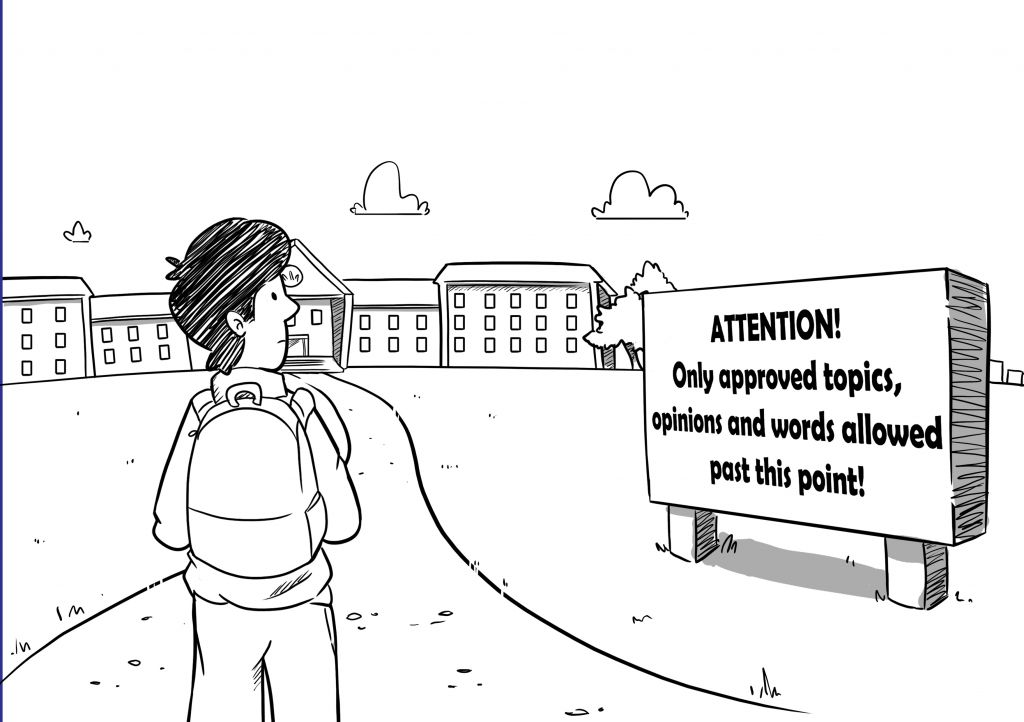Political correctness has gone too far.
This is a phrase you might have heard before. In fact, according to a poll by Angus Reid Institute, 76 per cent of Canadians agree.
The Oxford Canadian Dictionary defines political correctness as “the avoidance of forms of expression or action that exclude, marginalize, or insult certain racial or cultural groups.”
Canadian and American campuses have come under criticism for not doing enough to support these groups. In response they have adjusted policy and curriculum due to pressure from students who have larger and larger lists of “trigger” warnings.
Take one example at one of the most respected institutions in higher learning: Harvard University. Professors there for the past three years have had to compete with student organizations advising people that they do not have to go to classes teaching the law of sexual violence, as it might be traumatic for some. This has led to some professors dropping the subject altogether.
That is ridiculous and is sadly not an isolated incident.
Nobody is supporting rape or the severity of the damage it can cause. But you would think those opposed to it would want to learn how to combat it in a courtroom. This is not only detrimental to the individual for avoiding something difficult and not learning how to manage it, but it’s detrimental to society, as those who choose to avoid the classes are now poorly equipped to protect victims.
What if nursing students at Algonquin refused to do anything that involved the risk of seeing blood?
Political correctness also, however, deals with language and how we treat it, putting free speech at risk.
Free speech is an essential learning tool for colleges and universities. That includes the freedom to share ideas and thoughts with others, to challenge ideas you find flawed and to have yourself be challenged. That dialogue is how we grow our knowledge, not just on the subject we are studying, but our knowledge and understanding of the world. The more we understand people with different views and opinions, the better we can co-operate with each other in the workplace and in society.
You do not have to agree with everyone; that is what free speech allows. But people whose beliefs and ideas you disagree with have the right to state them. They have the right to expression just as much as you have the right to talk about why they are wrong. That does not mean you should stop them from talking. You might learn something buried in their words or learn about the person you do not want to be. Besides, we are taught to not judge a book by its cover. You actually might like what is inside.
This is something Canadian campuses are failing at. The Campus Freedom Index evaluates Canadian university campuses on criteria related to freedom of expression, granting higher grades to institutions that protect academic freedom and prevent the silencing of controversial views.
In 2016, only one student union received an A in either their policies or practices while 32 F grades were handed out, most notably to the University of Ottawa for maintaining speech codes that prohibits speech deemed controversial or offensive. Back in 2015, uOttawa became the butt of jokes after cancelling a free yoga class run by its Centre for Students with Disabilities, citing it as an act of cultural appropriation.
At the University of Toronto, Jordan Peterson, a psychology professor now known for his controversial opposition to Bill C-16, attempted to hold a free speech rally at the campus. Microphones were set up for students to engage in a discussion, to voice opposition or support. In what has now become an infamous event, student protesters blared white noise and static through their own speakers, preventing anyone from talking at all — a ridiculous thing to do at a free speech rally.
We must ask ourselves if this is what we want Canada to represent. We are known to accept those of different religion, skin colour and culture, but we are struggling to accept those with different views from our own. That doesn’t mean to sanction hate, as there will always be evil people in the world, but to accept diversity in all its definitions.
Algonquin College has been responsible in this regard, supporting initiatives such as celebrating Freedom to Read Week. In early March, the Algonquin library showcased books that have been banned or deemed inappropriate across North America.
Let’s keep this culture and these initiatives moving forward to make college campuses an example of intellectual and individual development where we are free to have open discussions and develop our own opinions together — something that universities in Canada seem to have lost.


